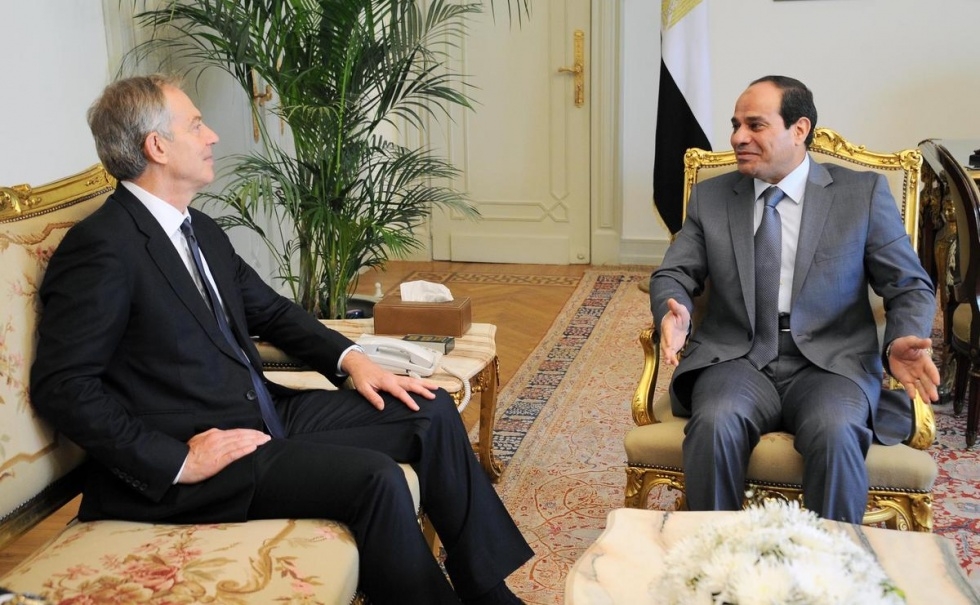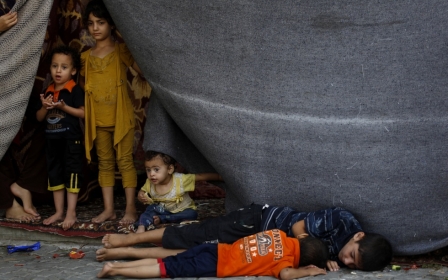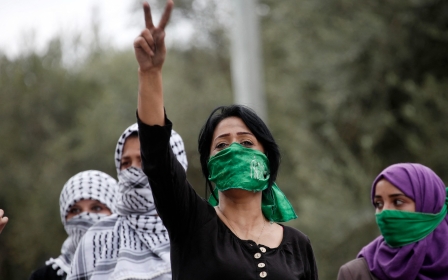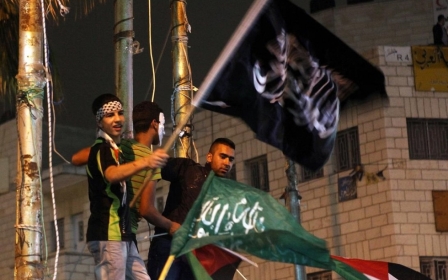Israel's war on Gaza is backed by Arab regimes

This is the third major Israeli war against the Gaza strip in less than six years. Yet, this war is unlike any of the previous ones, even unlike any previous encounter between the Arabs and Israel. This time Israel is not fighting the Palestinians alone. I am not here referring to the usual unconditional support Israel receives from the United States of America and its Western allies. For this goes without saying. I am talking about an unprecedented alliance between Israel and the regimes of some of the most influential and most pivotal Arab countries. This alliance is not necessarily because the rulers of these Arab countries are 'out-of-the-closet' friends of Israel or affiliates of the Zionist club. Rather, it is the convergence of vital interests; the coalition of those who came together once before to confront the sweeping winds of the Arab Spring.
Israeli commentators and politicians have kept no secret in this regard. They speak at ease about the fact that they are fighting Hamas in Gaza not only for their own sake but also on behalf of the rulers of countries such as Egypt, Saudi Arabia and the United Arab Emirates. Hamas is seen by these regimes as a twin sister of the Muslim Brotherhood, which is considered by them an existential threat. The attitude of politicians and the media coverage in those countries only confirm too well what the Israelis have been saying.
These Arab regimes concord with Israel in blaming the current war on Hamas. They, too, accuse it of embarking on an adventure that endangers the civilian population of Gaza. The truth, however, is that they are after Hamas' head no matter what. Israelis have alluded to promises made to them by the rich Gulf countries not only that they would consent to their campaign but also that they would be willing to fund the rebuilding of Gaza once Hamas is wiped off the map and its authority is replaced by their ally in Ramallah, Mahmud Abbas.
The Egyptian hostility toward Hamas is not entirely new. The Mubarak regime never liked the group and participated actively in maintaining the siege imposed on the Gaza Strip since the June 2007 events that led to the collapse of the Palestinian national unity government and the complete split between Gaza and the West Bank. Yet, the Mubarak regime was not popular within Egypt and many Egyptians, perhaps out of dislike for their own regime, sympathised with Gaza when Israel waged its first major war against it in December 2008. Gaza also benefited from the rampant corruption within the Egyptian police, intelligence and army, a corruption without which smuggling through the tunnels might not have been possible. Then the Arab Spring swept through Egypt and brought down the Mubarak regime paving the way for a democratic transition that brought the Muslim Brotherhood to power. Egypt's first ever democratically elected President Muhammad Morsi played a significant role in foiling Israel's second campaign against Gaza in Autumn 2012. The year he spent in power saw marked relaxation of the siege from the Egyptian side and had it not been for the lack of cooperation and noncompliance on the part of the deep state institutions the honeymoon might have been much sweeter and lasted for much longer. In July 2013, the Sisi-led army mounted a military coup that aborted Egypt's democratisation process and installed a military dictatorship in place. The impact on Gaza was devastating. Not only did the new authorities destroy all the tunnels and tightened the siege but they also started from day one inciting the Israelis to attack Gaza and bring down the Hamas regime. According to Israelis, the Egyptians kept telling them that circumstance for a new offensive were most favourable and might not remain favourable for long.
As for the Saudis, their relations with Hamas began to deteriorate after the June 2007 split. Nearly four months earlier, the Saudi monarch hosted a meeting in Mecca between Fatah and Hamas that ended several months of factional strife and paved the way for the formation of a national unity government. Although Hamas won the parliamentary elections of January 2006 it was not allowed to rule and had to make concessions to its rival Fatah. When the national unity government collapsed, the Saudi monarch was persuaded that Hamas was to blame and that its leaders, who made an oath in Mecca, reneged and violated the sanctity of the oath they made. Hamas leaders tried in vain to convince the Saudi royals that this was not true and that they were the victims of an American-led plot against them because the Americans never consented to the unity pact and vowed to undo it. The Saudi hostility toward Hamas was augmented by the advent of the Arab Spring that seemed to deliver to power groups associated with the Muslim Brotherhood wherever democratic free elections were held. The Saudis feared in particular the impact the emergence of a different model of 'Islamic' governance could have on their own population. For many decades the Saudis claimed a monopoly over an Islam-based model of governance, a model that was becoming increasingly identified more with a medieval theocracy than with Islam and exposed as a corrupt and oppressive regime. A successful Muslim Brotherhood-led regime would have posed an existential threat. For this reason they joined hands with their neighbours in Abu Dhabi to fund the toppling of Morsi's government and provide a political clout for the military dictatorship that replaced him.
The United Arab Emirates grew increasingly hostile to 'political Islam' and all its manifestations for reasons that continue to be somewhat mysterious. This trend picked up momentum quite rapidly following the demise of Sheikh Zayid in 2004. His sons, who reign over Abu Dhabi and wield power across the entire seven emirates, have since then been acting with vengeance against their own Islamists as well as those belonging to Arab expatriate communities. By the time the Arab Spring blew over the region, UAE prisons were swelled with detainees. Sham trials were later held leading to the sentencing of scores of Emirati professionals and intellectuals to 10 or 15 years of imprisonment for no other reason than their sympathy for movements such as the Muslim Brotherhood and Hamas. Individuals within the expatriate communities suspected of such sympathies, or accused of affiliation to the Brotherhood or Hamas, were detained, tortured and eventually deported.
The irony is that the vulnerability of Hamas, which prompted those three Arab countries to join ranks with Israel in the hope of weakening, if not destroying, the movement is turning to be, in some miraculous ways, a source of empowerment as well as of admiration and sympathy on the part of the Arab populations in those same countries as well as in the rest of the region. Despite the formidable military, political and financial Arab-Zionist alliance Hamas is having to defend itself against, it seems to be doing quite well so far. An Israeli plan, marketed as an Egyptian initiative, to impose surrender on Hamas in the form of a humiliating ceasefire deal, has been rejected by the movement. The rejection of the plan won the movement praise and applause across the Arab world. Arabs, whose countries have repeatedly been defeated and humiliated by Israel, are proud of Hamas and the people of Gaza for standing up to what was once trumpeted as the world's fourth strongest army.
The insistence of the Hamas leadership that no ceasefire proposal would even be considered unless it involved the lifting of the siege on Gaza and the release of re-captured freed Palestinian prisoners has enraged as well as embarrassed the Arab allies of Israel. It is not in isolation of this state of affairs that the Israelis are intensifying their brutal onslaught on Gaza's population and infrastructure. Having failed to achieve any of the objectives of its operation, Israel is aiming to pressure Gaza into surrender via increasing the civilian casualties by the minute. It may not be farfetched at all to assume that Israel's Arab allies may be cheering it as it is slaughtering women and children because they too want to see Israel win this war. If Israel loses, they stand to lose too.
-Azzam Tamimi is a Palestinian British academic and Chairman of Alhiwar TV Channel. His books include: Hamas: Unwritten Chapters (Hurst, 2007) and Rachid Ghannouchi: a Democrat within Islamism (OUP, 2001)
The views expressed in this article belong to the author and do not necessarily reflect the editorial policy of Middle East Eye.
Photo credit: A handout picture released by the Egyptian Presidency on July 12, 2014, shows Egypt's President Abdel Fattah al-Sisi (R) meeting with Mideast Quartet envoy Tony Blair in Cairo (AA)
New MEE newsletter: Jerusalem Dispatch
Sign up to get the latest insights and analysis on Israel-Palestine, alongside Turkey Unpacked and other MEE newsletters
Middle East Eye delivers independent and unrivalled coverage and analysis of the Middle East, North Africa and beyond. To learn more about republishing this content and the associated fees, please fill out this form. More about MEE can be found here.





